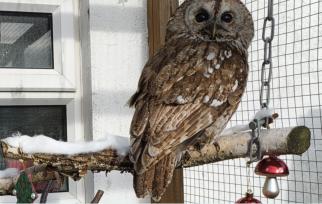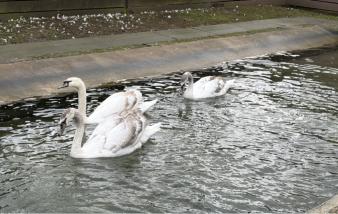
Latest News
Avian Influenza (Bird Flu) Sadly bird flu is now moving on from sea birds, to other species of birds, including geese, ducks and swans,
and the Trust is receiving many calls from the public spotting sick birds. There is no treatment available and sick birds will often die
within a day of showing symptoms. We cannot rescue or accept sick birds at the Centre as this would compromise those birds already in
our care and could lead to the Centre being forced to shut down.
Our advice, painful as it is to give, is to leave the bird and let nature take its course. Do not touch a dead bird or let a dog near it. The
local Council is responsible for collecting them in a controlled manner. In some cases you may report findings to DEFRA on 03459 335577
or visit their web site for detailed advice here.
***************************
"Swan Notes" News items written by Trust members and volunteers and usually appearing in the “Berwick Advertiser" newspaper each
week. For those unable to read these items, and those living outside the Berwick area, here are the last few editions...
5th March 2026
The milder weather in the last week meant that most of the hedgehogs were awake when I did my shift last Thursday. As we try not to
disturb them when they are hibernating, a period when they are awake gives us chance to change their bedding and weigh them to
check on their progress before it maybe turns colder again and they get a bit more sleep before the spring. The Wednesday team had
obviously had a busy day as most of the cards said “bedding changed”. One of the hedgehogs came out into his living area when I was
cleaning it so I got its food together quickly thinking it must be hungry, but Barbara told me that this hedgehog has a habit of
occasionally wetting its bed and when it does, it always comes out to let us know it needs room service! If its bed doesn’t need a refresh
it doesn’t appear so Do Not Disturb!
Thursday was also the day for a change in the pond water which is always a
happy day for the cygnets. When I arrived they were in the small pond area,
and were all peeping at me through the gaps in the fencing to see when we were
going to get around to finishing off the pond filling and letting them back in.
They enjoy the fresh water and have a few moments of madness splashing up
and down. They will not be released until the spring shoots begin to grow on the
river banks providing them with enough food to eat. Meanwhile, they have
decided they have eaten enough of the nutritious food pellets we have been
feeding them, they had been carefully lifted out of their food bucket and piled up
by the side.
I have recently returned from travelling to Belize in Central America and noticed
in one of the hotel shops that there were some greeting cards on sale in support
of the Belize Raptor Centre (belizeraptorcentre.org). The reason they caught my
eye was because some of them had a barn owl on them which felt a long way
from home, but as the guide reminded me, barn owls are found all over the
world and are a common resident species in Belize. On a trip out, the guide told me his friend volunteered for the centre and as a hawk
flew over, he pointed it out as one that he knew the Centre had helped and recently released. A discussion followed about the work of
the Swan Trust as, like us, they focus on rescue, rehabilitation and release; I told him we often had buzzards in and at that point our
worlds diverged again, as to him, a buzzard is a vulture. That would be an interesting challenge for us. The Belize Raptor Centre
sponsored big billboards across the area against the use of pesticides; they again featured the barn owl with a mouse in its mouth to
highlight that other creatures eat the vermin, so to consider more environmentally friendly solutions.
The weather forecast for the week ahead is looking much less wet and hopefully, two of the three barn owls currently at the Rollo Centre
will soon be released. The third one has been ringed now and is doing well, once the other two have moved on it will be able to move to
an outdoor area for some flight practice. I am sure we are all looking forward to some drier weather, the daffodils are out at the Rollo
Centre and are looking beautiful.
Gill Powell
26th February 2026
It seems like Spring is on its way at last! I was working with Kay on Sunday morning in the Hedgehog Shed and noticed that the
hedgehogs are beginning to wake up. Four or five of them had been out, checked out their food, had a drink and gone back to bed. It
does look as though this milder weather has encouraged them to get up.
We have checked out the weather forecast and for the next couple of weeks at
least it should be milder. With this in mind we are ready to release two of our Barn
Owls. We could not release them early due to the poor weather. These birds are
unable to hunt in continuous wet weather and it would have been wrong to release
them just for them to face starvation. Things are looking much better for them
now and they will stand a good chance of settling back in to their territory ready
for the nesting season. The awful long wet spell will have meant a good many
Barn Owls will not have survived. This leaves us with one Barn Owl that has to be
ringed before we release it. It will need a short spell in the Big Flight aviary to
build up muscle strength but will be ready to go in a couple of weeks.
On Sunday we released three of our Wood Pigeons. Two were young birds hand
reared but they have been having to find their food in the aviary so know how to
look for it themselves. The older one will know what to do after his wing healed.
We still have another three pigeons still needing a bit of time to grow feathers but
fortunately the finders of these birds are happy to take them back to where they
were found and release them when the time comes.
Our Cygnets are all looking good and the milder weather should mean that the river weed will be starting to grow. In our garden at home
the grass is certainly growing already. We hope to get them away around Easter time.
Last week we had a call about an injured juvenile swan at Branton. We are not able to rescue but the finders of this bird said they would
be able to help with it so Dick went out to have a look. The poor bird had dragged itself to the reeds at the edge of the lake from the
grass where it was seen earlier. Dick managed to hook the bird and bring it away from the water to examine it. He found it had open
wounds on both legs. One he thought was fractured at the top. It had wounds all round its back end. It looked as though it had been
attacked whilst it was trying to get away. It had no fight left and as Dick carried it carefully in a swan bag back to his car he knew it
would have to be euthanised. Just as he approached the car, he was met by an R.S.P.C.A. inspector and she offered to take the bird to
the nearest Vet. At least the poor bird did not have to suffer for so long.
We also took in a beautiful Long Eared Owl a few days ago. It was bright eyed and looked good but when Kay checked it out it had an
awful compound fracture of its wing. There was nothing the Vet could do although they checked it thoroughly. Such a shame.
Jackie and Mandy are doing a Table Top Sale at the Centre on 4th. April (Easter Saturday) from 10 a.m. to 2 p.m. Do come along.
Pat Goff
19th February 2026
We are working to get our 2027 calendar to the printer so that they will be ready nice and early this year. We try to do this every year
but there is always something that holds us up. This time we are working on the theme of releases. Using photos that volunteers have
taken as a bird or animal goes off when it is fit. We were stuck for a picture for December which usually features Errol our Tawny Owl
mascot. He is the only exception to our rule of keeping a casualty that cannot be released back into the wild. Errol has been with us for
over twelve years and due to his long recovery is far too people orientated to go back into the wild. He has his own aviary and loves
volunteers to chat to him when his aviary is cleaned every day. This is good for volunteers as most of the casualties in our care need to
have as little human contact as possible to keep them ready for release.
We decided he would make a nice December picture in his aviary if we added a few
Christmas decorations. We put up a silvery star from the roof (Kay tottering on a
stepladder) while Errol looked on enjoying the company. We then added a few more
decorations and some shredded cotton wool on his swing, which he loves to sit on.
When we finished he obligingly flew onto the swing, dislodging some of the cotton
wool snow and facing the wrong way!
I was moving round the aviary trying to get shots, but either the decorations were
not showing or I just had a good back view of Errol. Fortunately, he looked over his
shoulder and I got a picture. He flew off the swing but came back again and was
looking at the bits and pieces we had put up. I think he quite enjoyed the hour we
spent with him. We, meanwhile were absolutely frozen, unable to feel our fingers or
toes. We have not decided which picture to use in the calendar but this is one of
them that might just do. Our calendars always show the casualties we have,
although they may not be professional, the shots were all taken by people actually
doing the work.
We did also check up on all the casualties still in care. We have three Barn Owls. None of them needed any treatment. They just needed
time and a safe space to stay whilst they recovered from bruises and exhaustion. We have a selection of pigeons that were just the
same, all needing food water a safe space and time. We always come back to David Rollo, whose word still apply today, ‘Just give it a bit
more time’, in his quiet patient way, that used to annoy us sometimes, when we did not think it was any use carrying on with a casualty.
We usually had to agree that he was right. It is the one thing we are able to do at the Centre, thanks to staff and volunteers we can give
casualties time. One of the Owls took nearly a month to be able to build up strength to fly upwards. He was managing only a graceful
glide down for some time. Thanks to our cameras we were able to keep an eye on him at night and we were all thrilled when Jackie said
she had spotted him flying up to his perch instead of shimmying up the wire as he had done before. We just need some dry weather
before we can do some releases.
Pat Goff







































